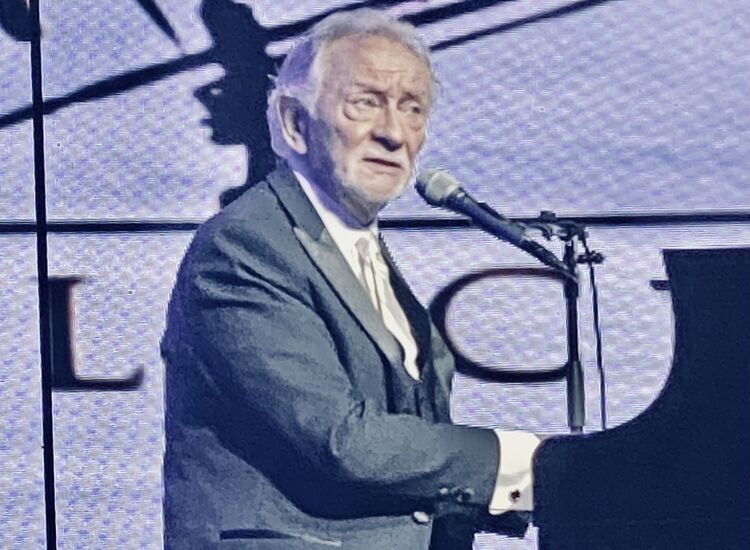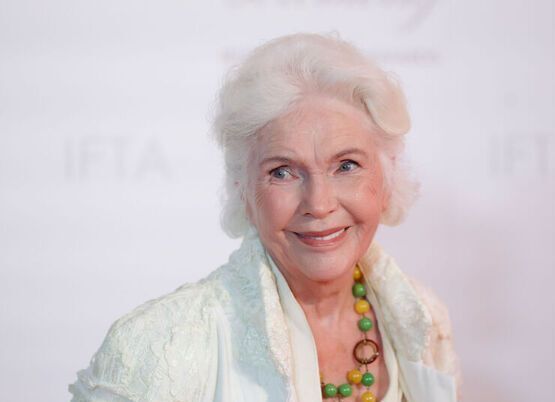David Latimer, author of "A Leap of Faith."
Page Turner / Edited by Peter McDermott
The story began with a paint-splattered church – the First Derry Presbyterian Church, to be precise. David Latimer, its minister and a long-time reserve army chaplain, made a personal appeal on a BBC news radio show to Martin McGuinness, the deputy first minister of the government in Belfast and a local elected representative.
That led directly to a meeting and, in time, to close personal bonds of friendship between two men from different faiths and opposing communities, and ultimately to the book by one of them dedicated to the other after his death: “A Leap of Faith: How Martin McGuinness and I Worked Together for Peace.”
“First Derry,” Latimer begins Chapter 2, “is on Upper Magazine Street, in the heart of Derry city centre, separated from the nationalist Bogside by the city’s historic walls. When I arrived [in 1988], the church was tightly wrapped in a security blanket.”
In Chapter 1, he recalls his early life and the incidents of the Troubles that touched him most personally: the deaths of William and Elizabeth Herron and their 27-year-old daughter Noeline, “a good Presbyterian family,” killed when an incendiary device exploded in their drapery shop, a business that served all of the community; Ian and Liz McCracken, co-workers who were among the 12 civilians killed in the La Mon restaurant bombing in 1978; and in 1981, RUC reservist Ronald Pollack, whose family attended the local church, was disabled by a bomb attached to his car.
At First Derry, he heard the story of how a congregation was “virtually brought to its knees by the Troubles. Five parishioners, all deemed legitimate targets because they were serving with the RUC and UDR, had been murdered by the IRA. The building itself – which had been a sacred space for Presbyterians since the first church opened in 1690 – was despised by republicans in the 1970s and ‘80s. It was regularly bombarded with bottles, bricks and stones – all launched from the other side of the historic city walls.”
However, when it was petrol-bombed in 1983, the “parishioners of Long Tower Church, the closest Catholic church to First Derry, organized a collection, which amounted to £1,100 and was quietly handed over as a gesture of support.”
After his arrival, Latimer did a joint Good Friday broadcast of readings and prayers with Fr. Michael Collins on BBC Radio Foyle and it became an annual event, and bonds were forged between clergymen and congregants of the two churches. However, it was the friendship between Latimer and McGuinness in the 21st century that garnered the most attention and had the deepest impact.
The Presbyterian minister, who was deployed to Afghanistan in 2008, said: “President Clinton, in his eloquent endorsement printed on the front cover of the book, succinctly encapsulates the substance of ‘A Leap of Faith’ when he writes, In a ‘Leap of Faith’ David Latimer recounts his remarkable friendship with Martin McGuinness – and reminds us all of the importance of building bridges between faiths if we are to truly share the future.’”
Latimer added: “It is our connection with each other that gives meaning to our lives. Caring for one another is what motivates us to make changes and establish connections with people from different backgrounds, which can be the key to bringing about change within our communities.”

David Latimer
Date of birth: August 1951
Place of birth: Banbridge, Co. Down, Northern Ireland
Spouse: Margaret
Children: Joanne, Jessica and Susannah.
Residence: Derry/Londonderry, Northern Ireland
Published Works: “Advice, Guidance, Help & Hope for When A Loved One Dies”; “A Leap of Faith.”
What is your writing routine? Are there ideal conditions?
As minister of two busy churches - First Derry Presbyterian Church in the city of Londonderry and Monreagh Presbyterian Church (six miles from Derry) in County Donegal – every day from morning to evening is punctuated with a wide variety of pastoral work. Consequently, my daily writing routine invariably began prior to my working day starting and continued in the evenings after normal church work finished frequently extending late into the night.
I can only imagine the ideal writing conditions to be somewhere on a remote “desert” island with minimal distractions and zero interruptions. Such conditions could be conducive to concluding a writing project in a shorter space of time.
Name a book that you were pleasantly surprised by?
It was my privilege to welcome Congressman John Lewis to First Derry Presbyterian Church a few years ago and to receive a signed copy of his book entitled, “Across That Bridge.” While it has been decades since the historic social upheavals of the 1960s the Civil Rights Movement continues to motivate and inspire us to sound the trumpet of love and human dignity and to persevere in the pursuit of peace and a better living space for all, regardless of their colour, creed or culture. Drawing on his many painful experiences as a Civil Rights leader Congressman Lewis provides a quite superb reservoir of advice, guidance and ideas sufficient to inspire succeeding generations to usher in a freer, more peaceful society.
If you could meet one author, living or dead, who would it be?
Without hesitation the one author I would dearly love to spend time with would be the late Reverend Dr. Martin Luther King Jr. A few days before the inauguration of President Obama in January 2912 I met with the late Dr King’s son, Martin Luther King III in the Washington hotel where Dr. King had written a portion of his “I Have a Dream” speech. My reason for being in Washington was to extend an invitation to Mr King to visit Derry in May 2013 as keynote speaker at a special youth peace event.
During the 2013 UK city of Culture celebrations I had the immense pleasure of welcoming Martin Luther King III to Derry. In his address to more than 6,000 people in Derry’s Guildhall Square the atmosphere was electrified when the “son of the dreamer” quoted the words of his late father.
The late Dr. King truly was an inspirational pastor, prophet and intellectual. The clarion call for freedom and justice, which rang throughout the world, continues to inspire each new generation with his message of non-violent resistance beautifully captured in the immortal words, “throw us in jail and we shall still love you; beat us and leave us half dead and we shall still love you.”
What book changed your life?
The Book that has changed my life, more than any other book, is the Bible and in particular the second section of the Bible known as the New Testament, which unpacks an incredible story about an amazing young man called Jesus.
Like all holy people, whose stories have been assembled in sacred texts indigenous to all world faiths, there is for me a way of life articulated in the synoptic gospels, which if adhered to, would serve to assist us to co-exist peacefully alongside one another and learn to live in relationship, not out of relationship, and get to know one another better. This might sound like a dream of an unknown place, but life is not worth living without a dream and working tirelessly to bring that dream to fruition.
What advice would you have for aspiring writers?
Having dipped my toes into the book writing arena I’m acutely aware of the time commitment required to engage in this work. My advice to any aspiring writer would be (i) set aside a significant slice of time to write your book and rigidly adhere to this because this will contribute to staying focussed throughout the entire writing process. (ii) Deliberately explore and extensively drill down to research your subject/topic and do this in advance of starting to write. Planning and preparation at the beginning will certainly lead to greater satisfaction as the book takes shape.
Name three books that are memorable in terms of their reading pleasure?
“A Gift of Love” by Martin Luther King Jr.; “The Hope Prayer” by Liam Lawton (this book was gifted to me by Martin McGuinness and as such is my most treasured piece of literature); “Eternal Echoes: Exploring our Hunger to Belong” by John O’Donohue.
What book are you currently reading?
“Reporting The Troubles”: journalists tell their stories of the Northern Ireland conflict. Compiled by Derek Henderson & Ivan Little.
Is there a book you wish you had written?
I cannot think of a book I wish I had written. However I’m currently contemplating the possibility of writing another book as well as reshaping my earlier bereavement booklet.
What is your favourite spot in Ireland?
When I was a young boy growing up in Dromore, Co. Down, it was the practice of my parents to rent a caravan in a lovely seaside town called Newcastle, also in County Down. Many enjoyable days were spent swimming in the sea, swinging and sliding in the children’s play park and climbing in the mountains.
Percy French succeeded in putting Newcastle on the world map with his song called “The Mountains of Mourne,” which is known and sung internationally.
Your Irish if …
You’ve got a sense of humor; you’re able to laugh at yourself and you don’t take life too seriously.








